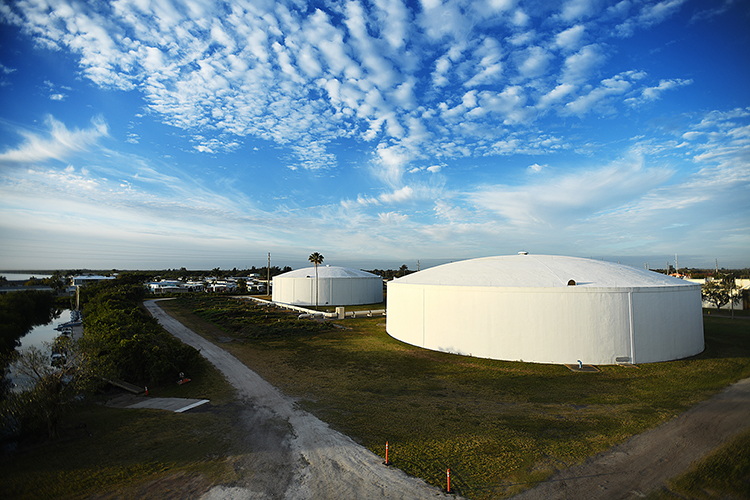
Christmas came early for Vero Beach, where officials learned last week the city had been awarded $25 million in state grants to help fund the construction of a new wastewater treatment plant.
And another gift from Tallahassee could arrive before Valentine’s Day.
“We’re obviously ecstatic with the state money we’ve received,” City Manager Monte Falls said after the first two grants were announced two Mondays ago, “and we’re pretty confident more is on the way.”
In 2020, the City Council approved a plan to replace its existing and outdated wastewater treatment plant – built on the banks of the Indian River Lagoon in the 1970s – with a new facility scheduled to begin operations at the Vero Beach Regional Airport in the first quarter of 2027.
Inflation, however, has pushed the projected cost of building and connecting a new plant from $82 million in 2021 to $132 million now. “That’s the best estimate we currently have,” Falls replied when asked Friday if the cost could go even higher.
The plant-construction project, which is scheduled to break ground this summer and take 30 months to complete, will be funded primarily by rate increases imposed on the city’s water and wastewater customers, including unincorporated county residents who live in the South Beach area and residents of Indian River Shores.
Falls said the grant money awarded last week – as well as another $15 million the city hopes to receive early in 2024 and any subsequent appropriations Vero Beach might receive from the Florida Legislature to support the project – will be used to offset, at least partially, the increase in the estimated construction costs.
“If we’re successful in getting the third grant, that’s $40 million we can put toward that $50 million increase in our projected cost,” Falls said. “That would leave a net increase of only $10 million, which, according to our calculations, would cost the average ratepayer an additional $3 per month.
“It’s still an increase,” he added, “but it’s not, ‘The sky is falling!’”
The state funds awarded to the city last week were:
- A $20 million grant from the Florida Department of Environmental Protection’s Water Quality Improvement Program, which this year allocated a total of $210 million for projects around the state.
- A $5 million grant from the Governor’s Office through the Indian River Lagoon Protection Program, which this year distributed $100 million statewide, including nearly $11 million to Indian River County for septic-to-sewer projects at Orchid Island Estates ($7.425 million) and Hobart Landing ($3.3 million).
The city also applied for a $15 million grant from the DEP’s Resilient Florida Program, which was created to help communities prepare for the impacts of hurricanes, storm surge, sea-level rise and flooding in an effort to protect the state’s natural resources and infrastructure.
Falls said Friday the city was still waiting for the program’s administrators to identify the newest recipients for the annual grants, adding that the announcement might not come until February.
It wasn’t until February of this year that Resilient Florida announced the program had awarded a $15 million grant to the Fort Pierce Utilities Authority to help fund the construction of a new mainland wastewater facility in an industrial site five miles west of its existing plant on Hutchinson Island.
“We’re basically doing the same thing Fort Pierce is doing,” Falls said. “Our site on the lagoon is susceptible to flooding, too, and we’re optimistic about getting the grant. But I don’t know when we’ll hear anything.”
Rob Bolton, Vero Beach’s water and sewer director, said the city may apply for a Resilient Florida grant again next year – or even the following year, because the plant will still be under construction – if the current request is denied.
The city also plans to seek an appropriation from the Legislature in 2024. Bolton said he already has discussed the matter with rookie State Representative Robbie Brackett, a former Vero Beach mayor.
There’s also a possibility federal Environmental Protection Agency grants might be available for such projects, Bolton said, but those funds are often funneled through the state.
In the meantime, the city’s water and wastewater customers already have begun paying more for those now-consolidated services. The City Council approved a substantial rate hike – the utility’s first since 2010 – last December.
Rates increased 15 percent in January, jumped another 18 percent in October and will again rise 18 percent in October 2024.
As a result, the average monthly water-sewer bill rose from $51 to $59 in January and to $69 in October, based on the use of 4,000 gallons per month. Next October, the average monthly bill will increase to $82.
At that time, the average city-system customer will be paying $360 more per year for water and wastewater service.
Those payments will not only cover the utility’s operating and maintenance deficits, but they will also provide the funding needed to build a new wastewater treatment facility, which will be located near the intersection of U.S. 1 and Aviation Boulevard, adjacent to the city’s water plant.
The city could have opted to refurbish the existing wastewater treatment plant for roughly 75 percent of the cost of building a new one at the airport. If the outdated facility isn’t moved, however, the city would lose nearly half of the 35 acres needed for its much-heralded Three Corners project at the west end of the 17th Street bridge.
Also, with an active wastewater facility to the immediate south, it’s unlikely any developer would invest in the adjacent 17-acre property that currently contains the city’s defunct power plant.
“These grants validate our objective to get the new plant built,” Vero Beach Mayor John Cotugno said, “and they help reduce the cost to our ratepayers.”



